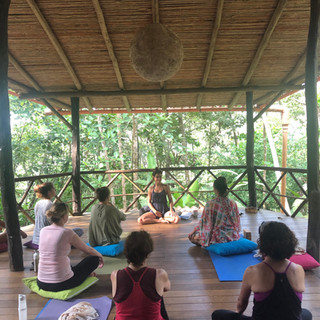Peru, Cacao, Coffee, and Reforestation
- Admin
- Oct 7, 2019
- 3 min read
Last month we traveled with a beautiful group of yogis to Peru for a week-long retreat in the Peruvian rainforest followed by a trip along the Inca Trail to Machu Picchu. Definitely a bucket-list trip for many of us! The retreat happened to coincide with the massive forest fires in Brazil taking over the news and social media. This made the theme of the retreat, biodiversity and re-forestation, even more important and clearly needed!
We started our trip at Chirapa Manta, a beautiful eco-lodge in the Peruvian rainforest, welcomed and taken care of by the owners Claudia, Javier and Martin. The beauty, the smells, the sounds... the rainforest is simply magical and nourishing in so many ways. We got to take it all in while enjoying yoga classes with Steffi Grube in the jungle shala, eating the most delicious vegan meals with many ingredients from the rainforest, and swimming in the river in our free time. In the middle of the week we got to join a local project that educates the youth about the importance of the rainforest and works hard to maintain the forest they have while starting initiatives to stimulate reforestation and biodiversity. Besides getting to actually do some work on the project, we also had a chance to learn about the impact of our own consumption and how we can make better choices by paying attention to where the product we buy actually come from and if they were created in a sustainable way. To top it off we got to plant our own trees and we hope to be able to plan many, many more in the future!
Our time at Chirapa Manta was magical, but we were not going to leave Peru before walking part of the Inca Trail and seeing Machu Picchu! In line with the theme and purpose of the retreat, we walked a part of the Inca Trail that is off the beaten track and almost free from tourist. Along the route we stayed with local farmers who are eco-certified and bio-diverse, meaning they recreate the mixture of plants and trees that the rainforest offers, on their land. Julia explained how all the different fruit trees on her land work together and need each other to grow and keep the land fertile. Alejandro took us onto his coffee plantation and explained the impact of climate change on the fungi in the forest which become stronger and often impact his harvest. Because he does not use pesticides the fungus can impact his harvest significantly. A way to make sure farmers like Alejandro can continue to grow coffee in a sustainable way that positively impacts our environment is to pay a fair price for your coffee and buy organic and fair trade coffee, mostly avoiding the largest companies in the industry.
The beautiful journey along the Inca Trail lead us to Machu Picchu, an absolute highlight. It is always humbling to learn about a civilisation that was able to live so in tune with its environment with so much respect for nature and all it had to offer. They had an intelligence that we can still hardly comprehend.
In short it was a journey that allowed us to meet many change makers that were all walking the talk and living the change we all need more of. We left inspired, more informed, and hopefully this will shine through in the daily choices we all make. If you feel inspired to make some lifestyle changes that support the rainforest, here are the top 5 tips from the beautiful people we met in Peru:
1. Stop eating meet, especially beef, or lessen your consumption. Cattle is the cause of most of the deforestation and destroys the land to the point that nothing grows back.
2. Know where your coffee and cacao is coming from and try to avoid large companies like Nestle and Unilever.
3. Avoid soy products and if you buy soy product try to buy organic and sustainably sourced soy.
4. Avoid products with palm oil.
5. Check what you bank is investing your money in. This is a difficult one as it is often ont so transparant, but a little research should give you a bit of an idea, so you are aware if it goes to projects like mining, deforestation for trade routes, weapon production, etc.
We hope you are as inspired as we are and as hopeful about the changes we can all make to contribute to the solution.

























Comments